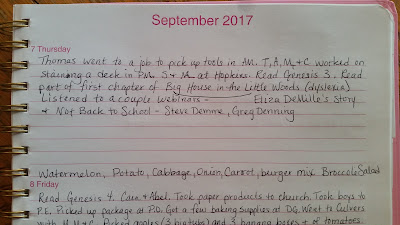That brings back memories of the little one room school I attended as a little Amish Mennonite girl. There were two "big boys" in school. One shorter and very athletic. The other taller, more gangling and uncoordinated. If the shorter one accomplished a high jump for instance, the taller one would say, "If you can, I can too!" He couldn't always but his attitude was priceless.

 Now that we've started "school", I spend time reading, studying and writing as I require the boys to do. We are trying to implement the Thomas Jefferson model of learning which says "Inspire, not require. But not neglect." It is very different from the "conveyor belt" model we grew up with so I am studying that as much as I can, trying to internalize the ideas. It is a more interest based way of learning.
Now that we've started "school", I spend time reading, studying and writing as I require the boys to do. We are trying to implement the Thomas Jefferson model of learning which says "Inspire, not require. But not neglect." It is very different from the "conveyor belt" model we grew up with so I am studying that as much as I can, trying to internalize the ideas. It is a more interest based way of learning.
Our studies begin with reading a Bible story together. This morning it was Genesis 6. The story of Noah finding grace in God's eyes and believing God when He said it's necessary to "evacuate". How believable was it that a storm of global proportions was coming? God can always, always be trusted. Why do we doubt His words?
Next we read a classic book aloud. The Little House in the Big Woods is the one we're in right now. Or as my somewhat dyslexic brain wants to word it The Big House in the Little Woods. I laughed so hard at myself after I did that. The mind picture...
What constitutes a "classic"? A book that you get more from, each time you read it. It contains lessons and principles that don't change. The Bible is our greatest classic. Some educators say nature is God's great classic. Get outdoors and learn the many lessons He has for you.
In our story this morning we read The Story of Grandpa and the Panther. As we read how Pa screamed like a panther for Laura and Mary, we wondered what it actually sounds like. YouTube furnished us with an example that was spine tingling.
Melvin went on to practice his math facts at Xtra Math.Christopher did some writing and then math practice at Khan Academy. He is also studying different motor bikes and recording the specs. The boys' interests are so varied.
Melvin is reading The Incredible Journey. Christopher has a number of books in progress. Ender's Game, The Light Princess, Bruchko, and I'm sure there are others. He is an avid reader.
 |
| This book assumes you have a basic knowledge of numbers and know your math facts. |
We don't stress workbook types of math until they're good and ready. Researchers tell me that all the math we traditionally labor to teach children in the first 6-7 years of school is unnecessary. They are able to learn it all in one year of study once they go through puberty. This is because their brains take on the ability to comprehend abstract thoughts during this time. As one instructor says, "Don't teach algebra until they have hair under their arms." Just save most of it until then really.
 |
| Book used in 7th or 8th grade Copyright 1960 (When people were smart) |
All the time we spend drilling, drilling, drilling only results in creating a hatred or fear of math because it is so hard at a young age. Sure play number games. Do fun things with math. Study the Fibonacci sequence. Use recipes or building projects to learn about fractions, measuring and etc. Use numbers in real life situations. All. The. Time. Workbooks? Never. Until 7th or 8th grade. New ideas? No. It's the old truth revived.
Did you grow up during a time when schools taught in a smart way?
Have you heard of the Thomas Jefferson (or TJEd) model?


No comments:
Post a Comment